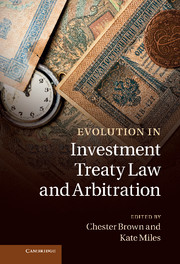Book contents
- Frontmatter
- Contents
- Contributors
- Editors' preface and acknowledgements
- Table of cases
- Table of Treaties
- Part I Introduction
- Part II Shifts in fundamental character
- Part III Actors in international investment law
- Part IV The new significance of procedure
- Part V Engagement with cross-cutting issues
- 21 Protecting intellectual property rights under BITs, FTAs and TRIPS: Conflicting regimes or mutual coherence?
- 22 Stabilisation clauses and sustainable development: Drafting for the future
- 23 A new investment deal in Asia and Africa: Land leases to foreign investors
- 24 Thirst for profit: Water privatisation, investment law and a human right to water
- 25 Economic development at the core of the international investment regime
- 26 Regulatory chill and the threat of arbitration: A view from political science
- Part VI Conclusions
- Index
- References
22 - Stabilisation clauses and sustainable development: Drafting for the future
from Part V - Engagement with cross-cutting issues
Published online by Cambridge University Press: 05 December 2011
- Frontmatter
- Contents
- Contributors
- Editors' preface and acknowledgements
- Table of cases
- Table of Treaties
- Part I Introduction
- Part II Shifts in fundamental character
- Part III Actors in international investment law
- Part IV The new significance of procedure
- Part V Engagement with cross-cutting issues
- 21 Protecting intellectual property rights under BITs, FTAs and TRIPS: Conflicting regimes or mutual coherence?
- 22 Stabilisation clauses and sustainable development: Drafting for the future
- 23 A new investment deal in Asia and Africa: Land leases to foreign investors
- 24 Thirst for profit: Water privatisation, investment law and a human right to water
- 25 Economic development at the core of the international investment regime
- 26 Regulatory chill and the threat of arbitration: A view from political science
- Part VI Conclusions
- Index
- References
Summary
Introduction
‘Stabilisation clauses’ are a common feature of long-term investment contracts between foreign investors and host States, particularly in the developing world. Following the execution of the contract, which will typically be governed by the domestic law of the host State, changed political and economic circumstances may lead the government to change the law. The change in law may amount to bona fide law reform, but the government may also change the law in a capricious or opportunistic way. The essential purpose of stabilisation clauses is to impose some constraints on the host government's ability to amend domestic law in a way which affects the investment contract, including by providing that the investor shall be compensated if detrimental changes in law occur. In one sense, stabilisation clauses can be seen as straightforward contractual devices which allocate the risk of a change in law to the party best placed to avoid it. In another sense, and to the extent that stabilisation clauses attempt to address the special risks created by the State's capacity to exercise sovereign powers to affect its contractual relationship with the investor, they are properly seen as a creature of international investment law.
The use of stabilisation clauses to deter host States from amending domestic law has led to allegations that they represent an obstacle to sustainable development. In particular, it has been suggested that stabilisation clauses may discourage governments from introducing or enforcing laws relating to the protection of human rights, and environmental conservation. Criticism of stabilisation clauses has mainly been targeted at projects in the energy and natural resources sectors, where the potential for negative impacts on human rights and the environment is often considerable. These are also sectors in which investors are exposed to significant political and economic risks. Their upfront capital investment – often measured in hundreds of millions or even billions of dollars – may only be recovered over the (very) long term. The stability and predictability of the legal and regulatory framework is fundamentally important for investors who are risking capital in host States that have a ‘volatile legal and institutional system . . . which the foreign company (often quite legitimately) does not trust’.
- Type
- Chapter
- Information
- Evolution in Investment Treaty Law and Arbitration , pp. 516 - 538Publisher: Cambridge University PressPrint publication year: 2011
References
- 2
- Cited by



